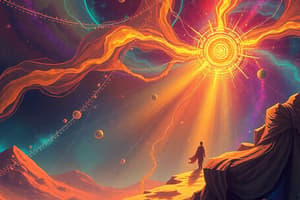Podcast
Questions and Answers
What is the main commandment discussed in the passage?
What is the main commandment discussed in the passage?
- Love your neighbor at all costs
- Love the Lord your God with your heart and mind (correct)
- Honor your parents and ancestors
- Only follow the laws of the land
What underlying issue does the text propose affects relational and affective problems?
What underlying issue does the text propose affects relational and affective problems?
- Lack of technological advancements
- External societal pressures
- Deep fears and insecurities (correct)
- Miscommunication between individuals
What happens if dignity is not recognized according to the content?
What happens if dignity is not recognized according to the content?
- It leads to greater understanding of oneself
- It causes relational wounds and self-contempt (correct)
- It encourages a pursuit of excellence
- It fosters a sense of community
How did Jesus respond to the lawyer's question about inheriting eternal life?
How did Jesus respond to the lawyer's question about inheriting eternal life?
What does the author suggest about young people's hidden beauty?
What does the author suggest about young people's hidden beauty?
What does the text warn against regarding emotional symptoms?
What does the text warn against regarding emotional symptoms?
What is regarded as the 'real enemy of love' in the text?
What is regarded as the 'real enemy of love' in the text?
What is the primary activity of science as described?
What is the primary activity of science as described?
How does religion primarily express its core beliefs?
How does religion primarily express its core beliefs?
What role does the cultural context play in understanding dignity as per the content?
What role does the cultural context play in understanding dignity as per the content?
What characterizes naturalistic religiosity?
What characterizes naturalistic religiosity?
What is one of the key differences between science and religion?
What is one of the key differences between science and religion?
What provides meaning and values according to the concept of religion?
What provides meaning and values according to the concept of religion?
Why might the perspectives of science and religion interfere with each other?
Why might the perspectives of science and religion interfere with each other?
Which of the following terms best defines the pursuit of organized knowledge of nature?
Which of the following terms best defines the pursuit of organized knowledge of nature?
What forms the foundation of communities in religious contexts, according to the document?
What forms the foundation of communities in religious contexts, according to the document?
What does the term 'Mysterium tremendum et fascinans' describe in the context of divinity?
What does the term 'Mysterium tremendum et fascinans' describe in the context of divinity?
In the context of the provided content, how is God perceived by believers?
In the context of the provided content, how is God perceived by believers?
What is a defining characteristic of the Mesopotamian cultural conception of divinity?
What is a defining characteristic of the Mesopotamian cultural conception of divinity?
According to the content, how does the contemplation of the divine's tremendousness affect human emotions?
According to the content, how does the contemplation of the divine's tremendousness affect human emotions?
What is one key question raised about worldviews in the activity?
What is one key question raised about worldviews in the activity?
What critique is mentioned regarding the first three worldviews discussed?
What critique is mentioned regarding the first three worldviews discussed?
In ancient cultures like Mesopotamia and Egypt, how were gods typically represented?
In ancient cultures like Mesopotamia and Egypt, how were gods typically represented?
What central aspect distinguishes a 'religion' from other belief systems, as suggested in the provided content?
What central aspect distinguishes a 'religion' from other belief systems, as suggested in the provided content?
Flashcards
Science: Object of Knowledge
Science: Object of Knowledge
Scientific knowledge aims to understand the natural world through observation, experimentation, and the creation of laws and theories. It is expressed in a clear and public language, often using mathematics, and is subject to rigorous scrutiny by the scientific community.
Religion: Object of Knowledge
Religion: Object of Knowledge
Religion explores human connection to a divine or transcendent reality beyond the material world. It's based on faith and seeks to understand the meaning and values of life through this connection.
Science: Process of Knowledge
Science: Process of Knowledge
Science focuses on the observable and measurable aspects of the natural world, using empirical methods to gather evidence and test hypotheses.
Religion: Process of Knowledge
Religion: Process of Knowledge
Signup and view all the flashcards
Naturalistic Religiosity
Naturalistic Religiosity
Signup and view all the flashcards
Materialistic Naturalistic Religiosity
Materialistic Naturalistic Religiosity
Signup and view all the flashcards
Spiritualistic Naturalistic Religiosity
Spiritualistic Naturalistic Religiosity
Signup and view all the flashcards
Cultural difference in dignity
Cultural difference in dignity
Signup and view all the flashcards
Root of dignity difference
Root of dignity difference
Signup and view all the flashcards
Experiencing dignity
Experiencing dignity
Signup and view all the flashcards
Loss of dignity
Loss of dignity
Signup and view all the flashcards
Relational wounds
Relational wounds
Signup and view all the flashcards
Christian commitment
Christian commitment
Signup and view all the flashcards
Addressing emotional problems
Addressing emotional problems
Signup and view all the flashcards
Enemy of love
Enemy of love
Signup and view all the flashcards
God as 'You'
God as 'You'
Signup and view all the flashcards
Mysterium Tremendum et Fascinans
Mysterium Tremendum et Fascinans
Signup and view all the flashcards
Religion
Religion
Signup and view all the flashcards
Worldview
Worldview
Signup and view all the flashcards
Image of God
Image of God
Signup and view all the flashcards
Cultural Concept of 'Person'
Cultural Concept of 'Person'
Signup and view all the flashcards
Anthropomorphic Gods
Anthropomorphic Gods
Signup and view all the flashcards
Divine Origin of Humans
Divine Origin of Humans
Signup and view all the flashcards
Study Notes
Introduction: Science and Religion
- Science is a human activity focused on understanding nature through observation, experimentation, and expressed in laws and theories. It uses unambiguous language, usually mathematical, and is reviewed by the scientific community.
- Religion is a belief system centered around a Supreme Being beyond the material world. It provides meaning, values, and guides human behavior through rituals. These beliefs shape communities and differ between religious traditions.
Reasoning Types of Religions
- Naturalistic religiosity seeks meaning in the natural world. It can be materialistic (believing only in matter) or spiritualistic (accepting spiritual realities without supernatural connection).
- Religion of mystery sees a sense of mystery and the inexplicable in the universe, beyond scientific understanding.
- Pantheism identifies God with all of reality, with no separation. Hinduism, Buddhism, and Taoism are examples of pantheistic traditions.
- Deism sees God as a transcendent creator who does not intervene in the world after creation. This idea was popular during the Enlightenment.
- Theism believes in a transcendent creator God with a personal character who interacts with the world. Judaism, Christianity, and Islam are theistic religions, focusing on God's revelations.
Differentiating Terms
- "Religion" can be a conceptual system of beliefs or an experience of faith, followed by a philosophical interpretation (theology).
- Faith is a personal experience of grasping the absolute mystery, not just rational knowledge. It relates to perceiving a divine 'you,' not just an object.
Analyzing Worldviews
- A worldview is a complete conceptual system. Evaluate its claims, their basis, logic, and relationship to scientific understanding.
- Critically analyze different worldviews (e.g., the three mentioned in the text) and their strengths and weaknesses.
Religion and Cultural Concept of Person
- Early cultures, like Mesopotamian and Egyptian, often associated divine attributes with rulers, making them analogous to God on Earth.
- The Judeo-Christian perspective emphasizes humanity being created in God's image, possessing inherent dignity and dependence on God. It also presents humans as having a relationship with God, the world, and each other.
- This perspective contrasts with earlier cultures, where dignity was often tied to social standing.
Activity: Understanding the Difference Between Worldviews
- The text encourages critical analysis of how worldviews form and how these differ from scientific findings.
- Analyze how each worldview is based, whether or not its claims arise from scientific evidence, and what the "rationality" of each view is.
Expression of Christian “Commitment”
- Christian experience involves a meaningful integration of faith and the effort to live a healthy life.
- Difficulty in experiencing 'inherent dignity' stems from relational or emotional wounds; these wounds can manifest as feelings of inadequacy.
- Healing from relational wounds is key to embracing inherent dignity, preventing self-contempt, and allowing for the experience of love. Love heals relational wounds.
Studying That Suits You
Use AI to generate personalized quizzes and flashcards to suit your learning preferences.




